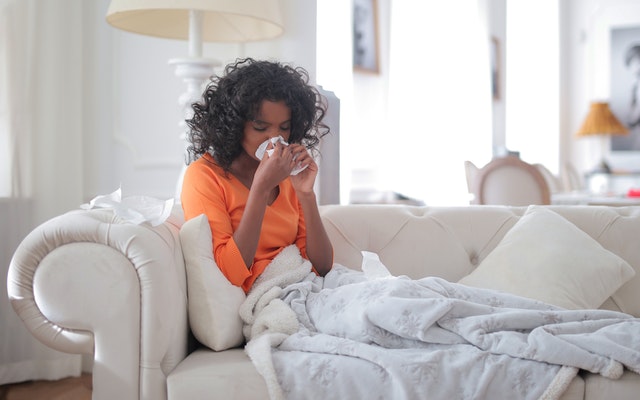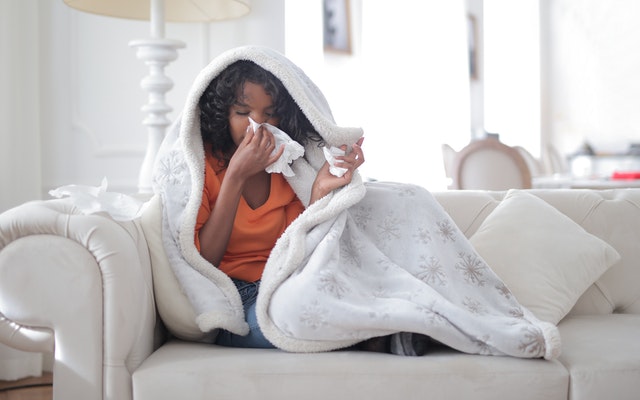Hay fever (or seasonal allergic rhinitis) is caused by an allergen: pollen from trees, grasses, and herbs. This causes a dilation of the blood vessels and an inflammatory reaction of the body. The result is unpleasant symptoms: itchy throat, swollen eyes (even conjunctivitis), stuffy or runny nose, frequent sneezing, headaches, itching… For allergy sufferers, even the smallest outing can quickly become an ordeal. Fortunately, some good habits that may seem harmless can help you to plan more serenely for periods of risk. Discover these mistakes and aggravating factors to avoid.
9 Mistakes to Avoid to Fight Hay fever

Not knowing the basic gestures about Hay fever
Sometimes, coping with your pollen allergy is as simple as knowing the pollen levels in the air. This way, you can avoid going out during the big pollen peaks! Be careful also in case of strong wind, as they carry the pollen. Do not hesitate to wear glasses, a hat, hair tied back, and a mask. In addition, remember to quickly remove your jacket and shoes at home. Above all, don’t keep them indoors so as not to deposit allergens everywhere. You can also change your clothes when you return home so that you don’t keep the “contaminated” clothes you wore during the day.
And finally, don’t skimp on hygiene. Wash your hair after an outing and brush it well to avoid depositing pollen on your pillow. Otherwise, you could spend the night breathing it in, which could lead to anaphylaxis. Do the same for your nose with a saline solution and prefer showers in the evening to remove allergens stuck to the skin.
Eating tomatoes
Unfortunately, there are often cross-allergies between pollens and foods. This involves a reaction between the allergenic pollen and the proteins contained in certain fruits and vegetables. For example, if you are allergic to alder or birch pollen, you should not eat cherries, apples, or celery. And when it comes to hay fever, the foods you shouldn’t eat are peaches, potatoes, and tomatoes. All of these can make your spring allergies worse. So, don’t hesitate to consult an allergist to find out which foods to limit to avoid making the attacks worse.
Opening windows at the wrong time of day
Opening the windows to air out your home is one of the ways to make your home healthier. However, by doing so, you are opening the door to allergens which then penetrate your cocoon and embed themselves in your carpets and curtains to harm you! Fortunately, pollens are not present in equal numbers at all times of the day. This is why you should preferably open your windows early in the morning, when it is raining or in the evening. On the contrary, avoid opening them during the sunniest hours, especially between 11 am and 4 pm. As far as the car is concerned, it is better to opt for air conditioning with the closed circuit option and avoid opening the windows. The best thing? Install anti-pollen filters for peace of mind!
Dry your laundry outside
The weather is nice. It’s hot. It’s hard to resist putting your clothes outside to dry in the sun and get a natural whitening effect. However, be careful: wet laundry will become impregnated with airborne pollen grains. In fact, when you bring your laundry inside, clothes and sheets will cause very unpleasant allergic reactions! By the way, remember that you should change your sheets, pyjamas, and covers very often, by washing them warmly every week. And when buying pillows, comforters, box springs, and mattresses, avoid feathers and use anti-mite materials.
Don’t take care of your home maintenance
Between the dust and the pollen that has managed to find its way into the house, our interior can become very unpleasant during an allergy. It is then better to avoid accumulating objects (books, decoration…) that could be exposed to it. Also, don’t skimp on the cleaning of upholstery (cushions, covers, curtains…). Vacuuming with a HEPA filter at least once a week is essential. Take the opportunity to vacuum your mattress! Also, dust with a damp cloth very regularly. In short, from the floor to the ceiling through the air vents, be tough on dirt and dust.
Wait before taking your treatment for Hay fever
Is this the time of year when you are at risk for allergies, but you wait until the symptoms appear before treating them with medication? Bad idea, because antihistamines and doctor’s treatment offer optimal relief when taken in anticipation, not just in case of an attack. Moreover, these allergies weaken the body and quickly make it even more sensitive to pollen. This also weakens the immune system and it is not uncommon to get sick after an allergic episode (cold, sinusitis…). So, taking your medication during the allergy season can save you a lot of discomfort! Also, think about stocking up on ingredients to concoct some natural remedies to calm and relieve you.
Diffuse perfumes or essential oils at home
Unfortunately, they don’t have the power to eliminate pollens. Moreover, they can be harmful, because it is very important to always breathe clean and healthy air. Perfumes often contain all kinds of air pollutants. In the end, they only pollute the air and should be avoided like all potentially irritating substances (tobacco, fresh paint, ammonia, chlorine, scented plants…)! However, having an air purifier equipped with the right filters can be an advantage in preventing symptoms at home. Also beware of menthol-scented tissues, for the same reasons, and those softened with milk proteins. In short, favor the simplest tissues without too many added substances!
Good to know: When your eyes itch, don’t scratch them with your hands that are probably covered in pollen. If you can’t rinse them with cold water, your tissues can be moistened to gently clean and soothe them.
If you know more informations about Hay fever like these, Share them with us.

